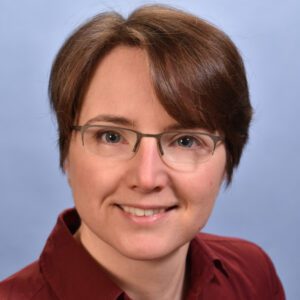Prof. Dr. Dietlind Zühlke
Professor of Applied Mathematics with a focus on Interactive Machine Learning at TH Cologne
»At TH Cologne, we have very good links to the local and national economies.«
As a professor of Applied Mathematics Prof. Dr. Dietlind Zühlke’s focus is on Interactive Machine Learning at TH Cologne. About the study location NRW and the advantages of a practice-oriented education in the field of artificial intelligence.

You teach and research at the Institute for Data Science, Engineering, and Analytics at the Cologne University of Applied Sciences, Germany’s largest university of applied sciences. What can young people, interested in artificial intelligence, expect from studying at TH Köln, and what are perhaps even advantages compared to training at a university?
At the University of Applied Sciences, we have very good links to the local and national economies. During their studies, many of our students have the opportunity to carry out practical projects, project work and final theses in cooperation with companies. This also applies to the field of artificial intelligence. Students immediately see the applicability, opportunities and limitations of AI methods in the real world. This also means that it is often a matter of implementing things in concrete terms. This requires students not only to be willing to program independently but also to deal with the content of the subject domains. In return, however, as a student, you also get the good feeling of being involved in a relevant development, that you influence the design of promising technologies.
What do you think is special about North Rhine-Westphalia as a place to study?
NRW is the most populous state in Germany, so there’s a good chance of meeting lots of like-minded people. That’s good for networking and it pushes motivation. There are also many start-ups and initiatives to establish technology locations, often near universities or colleges, for example the Innovation Hub Bergisches Rheinland in Gummersbach. This also opens up direct job opportunities for students, since the companies already know them from joint research and development work. And you shouldn’t underestimate NRW’s cultural aspects as a factor in choosing a place to study. Where so many people come together (literally from all over the world) there is also a wealth of extracurricular activities on offer, be it sports or, for example, gaming, theater, music or cinema.
When talking to business players or graduates, in which areas do your former students prefer to work and where is there a particularly high demand for skilled workers?
Due to the close connection with engineering sciences in Gummersbach, we see many students starting in companies that have something to do with mechanical engineering. These can also be suppliers. Here, AI is playing an increasingly important role in many areas (from supply chain to risk assessments in machinery to automated optimization of machine parameters). Another significant branch is consulting. In addition to the Big Four consulting firms, which have been employing graduates in the field of artificial intelligence for some time, there is an increasing number of small, specialized consultancies. These target companies in a specific industry, for example, or focus on certain aspects of AI, such as text analytics or social media analytics. University graduates are particularly welcome here, as they are said to have a certain hands-on mentality.
Dietlind Zühlke studied computer science with a focus on artificial neural networks in Leipzig and Bonn. Later, she worked as a research assistant and project manager at Fraunhofer FIT and Fraunhofer IAIS in the areas of medical image and data processing and data science for almost 10 years. During this time, she completed her external Ph.D. at the University of Groningen (Netherlands) on Machine Learning in breast cancer research. Five years ago, she moved into consulting and worked as a Data Science Consultant at OC&C Strategy Consultants and Seven Principles AG. Since 2018 she is Lead Data Scientist at Horn & Company Data Analytics GmbH and since 2019 Professor of Applied Mathematics with a focus on Interactive Machine Learning at TH Cologne.